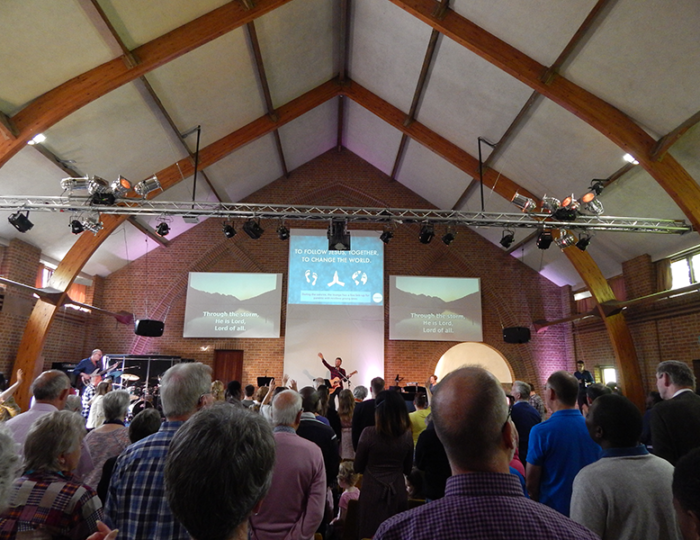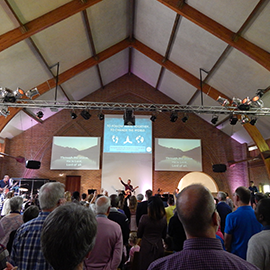The Leaving-Lockdown Church Utility Kit
Equip your congregation for their new worlds How did you feel when you first started planning a return to the church building? Relieved? Excited? Nervous? Chanc...
Read


One of my neighbours has exceptionally green grass. Walking past it every day, I had exceptionally green eyes. I wanted my grass to look like that. So, I asked the neighbour what he does, and now my grass looks…
Well, it’s definitely greener than it was.
If you want to sustain and develop a healthy lawn, ask someone who’s managed to do it. And if you want to know how to sustain and develop a culture of making whole-life disciples in a local church, ask churches who have managed to do it.
Over the years, at LICC, we’ve noticed that some churches grasp the vision of whole-life disciplemaking, and they make real progress. And then – well, all kinds of things happen. The vision fades, other demands shout louder, key leaders or influencers move on, ideas run dry, discouragement sets in. It goes on the back burner. Or it becomes ‘that thing we used to do’.
Then there are others who, despite facing many challenges, keep whole-life disciplemaking not just going, but growing.
Over the summer and autumn of 2020, we conducted in-depth research with eight UK churches, representing a range of sizes, denominations, and geographical locations. Making whole-life disciples has been significant for them for at least five years, and some have been going for around 20 years.
With each church, we interviewed the senior leader, one other leader, and a member of the congregation, asking them a range of questions to find out what they’ve done.
As we analysed these conversations, themes began to emerge: some were traits and practices that ran across the whole community, while others were particular to their leaders. These findings are already helping us develop new training and resources – and we hope they’ll help you embed a culture of whole-life disciplemaking wherever God’s placed you in his church.
You can dive into the full findings in the Sustaining Change report – and to whet your appetite, here are the headlines.
There are threads that run throughout these churches we looked at, ingredients that seem to help keep whole-life disciplemaking pumping through their veins. Here’s a summary of each.
1) Keep the Bible central (and connect it to everyday life)
Whether it’s in their preaching, their small groups, or in pastoral settings, the Bible is at the heart of what these churches are doing. Both leaders and congregation members talked about how important this is. Some people suspect that focusing more on where people are during the week will somehow detract from the centrality of Scripture. But what we observed with these churches is the complete opposite. The more they focus on frontline1 discipleship, and the more they recognise the Bible can help them to be more Christlike wherever they are, the more they love the Bible.
2) The power of stories
All of these churches found that stories of God at work in people’s everyday lives act like fuel for the journey. Stories remind people that God can work ‘through people like me, in places like mine’; they help people recognise God’s involvement in their own contexts. These churches find all kinds of ways to get people sharing their stories, with the most common being a regular This Time Tomorrow (TTT) slot. Some of them also reported an increase in storytelling during lockdown, with people being interviewed or sending in videos for their online services. And a nice little by-product of people sharing stories is it helps congregation members get to know one another better. As one respondent said, people become ‘more 3D’, and another said hearing people’s stories reminds you they are not ‘clones’!
3) Getting specific, getting personal
These churches recognise that different seasons of life and sectors of work throw up different challenges and opportunities. They recognise that people’s daily contexts really matter, and they must take them into consideration if they’re going to help each other follow Jesus better in those places. While recognising the value of the big gathering, they’ve learnt that certain shifts only take place in smaller groups, or through one-to-one conversations. Some of the ways these churches are getting specific and/or personal are through groups and courses aimed at specific seasons and sectors (e.g. parenting, retirement, senior management); frontline visits; mentoring; and good old-fashioned conversation.
4) Healthy balance (and a more integrated approach)
We all know how busy church life can get. Some things – like rotas and pastoral crises – scream for your attention, while disciplemaking is barely a whisper. So the churches we interviewed find ways to make sure making disciples isn’t drowned out by the noise. What’s more, they go beyond making sure discipleship is a ‘topic’ they cover regularly – they integrate it into everything they do. Some leadership team meetings have time at the beginning to share frontline stories before they discuss safeguarding policies, the building project, and the church weekend away. Some run intern programs, where young people are taught what servant leadership looks like in the world of work, as well as in the world of youth work. Whole-life discipleship is in their DNA.
5) One another ministry
Discipling isn’t something merely done to church members, it’s done by church members. In these churches, people are helping one another grow by sharing their stories, teaching one another, asking good questions, praying for one another, and taking part in small groups that take the frontline seriously.
6) An emphasis on personal responsibility
Increasingly, these churches are moving away from a consumer mentality in church life. Less is done ‘to’ and ‘for’ people, with a much greater focus on answering the ‘why’ and the ‘how’ questions of living as a disciple. There is more of a focus on providing people with resources and opportunities – the tools and environments that help them grow as resilient whole-life disciples.
7) Persistent persuasion, not continuous conflict
To be honest, I was a bit disappointed by this one. Going into these interviews, I was expecting to hear of ‘wars and rumours of wars’. The reality however was much less blockbuster. As these churches have focused more on people’s everyday lives, there has been apathy or a desire to maintain the status quo from some groups and individuals, but there haven’t been many grand showdowns. Rather than getting into big fights with people, what these leaders and influential congregation members tend to do is invest more of their energy on those who do ‘get it’, and on explaining to newcomers why focusing on whole-life discipleship is important. And there is just a general drip-feeding in everything they do.
8) Outside inspiration
Finally, along the way it’s sometimes helpful to have a voice from outside to bring fresh encouragement, insight, or challenge. These churches have found that getting knowledgeable, passionate whole-life enthusiasts from outside to come and speak has helped inject new life. Many of them also commented on the value of external resources and courses in helping people grow as whole-life disciples.
The eight ingredients outlined above were operational right across these church communities. But as we interviewed the leaders, and also listened to what congregation members said about their leaders, we noticed significant things that help these leaders and their churches keep going and growing as whole-life disciplemaking communities.
As with the eight ingredients, there are rich descriptions and quotes from the interviews in the report that show these things in greater depth and colour. What we noticed about the leaders of these churches was:
If you’ve read anything here that’s pricked your ears, why not take a look at the full report (or the particular sections that interest you)?
And then after that… it depends who you are. The questions you ask will probably be the same as your peers: ‘Where are we already doing some of these things? And where might we need to strengthen?’ But the areas in which you try to work this out all depend on your position within the church. Perhaps you’re a small group leader, or head up a particular team or ministry within a local church. How might these findings shape what you do there?
Or maybe you’re a church leader, or part of a leadership team or PCC – how are you doing as a whole church, and what steps might you need to take to strengthen your disciplemaking ministry?
Or maybe you have influence and responsibility within a region, a diocese, a network, or denomination – how might the findings of this report help you in your efforts to support and strengthen the churches you serve? Who else do you know who would benefit from learning from these findings?
Whatever your particular next steps, we’re here to help. If you’re interested in training and resources to help you and your church or network grow as whole-life disciplemakers, take a look at what we have to offer or contact one of our church consultants. And, if you have any questions regarding this research specifically, please feel free to contact me directly at [email protected].
Joe Warton
Church Team – Research & Development
—
1 In this case, ‘frontline’ just means the places where people regularly spend time with those who don’t know Jesus – jobs, shops, homes, pubs, and beyond.